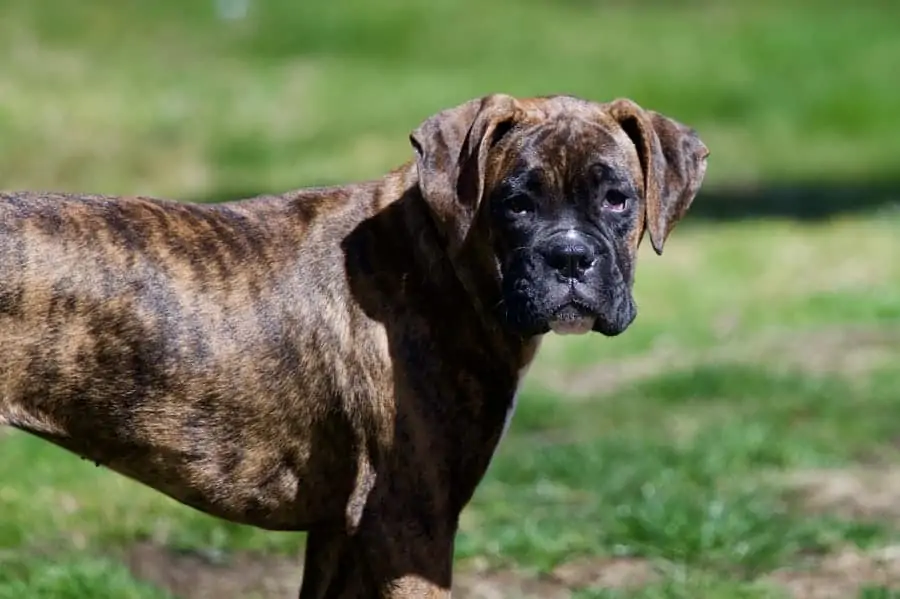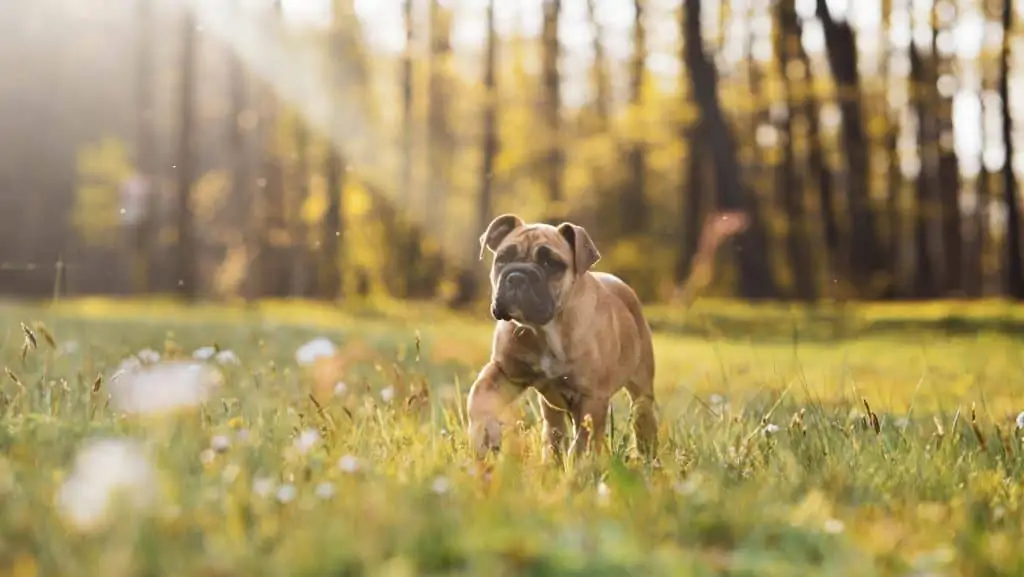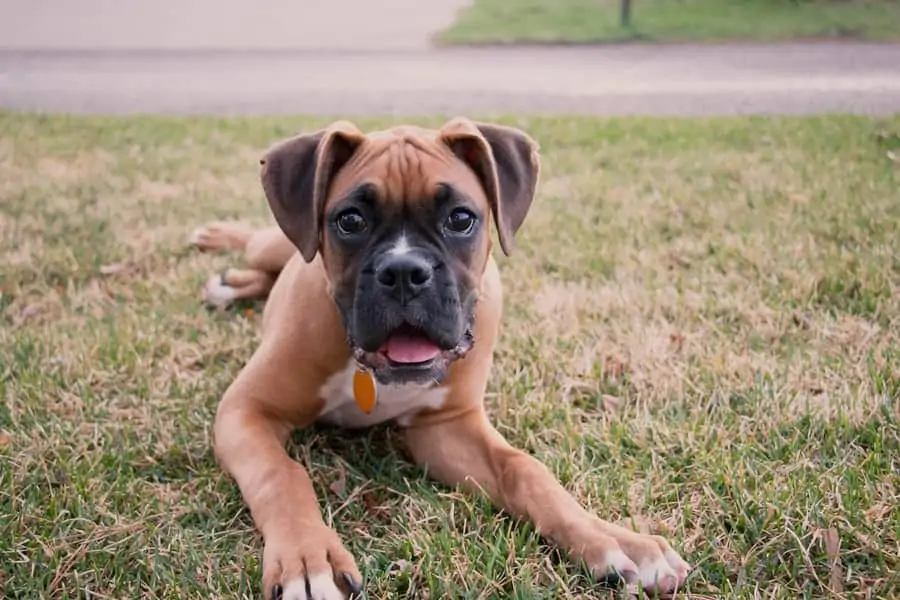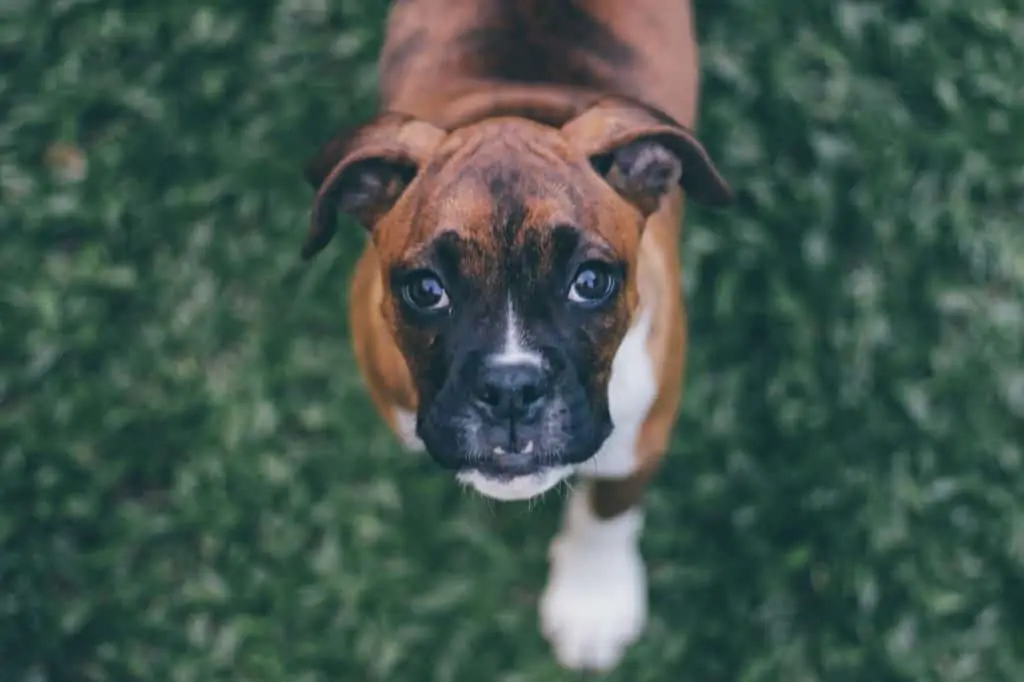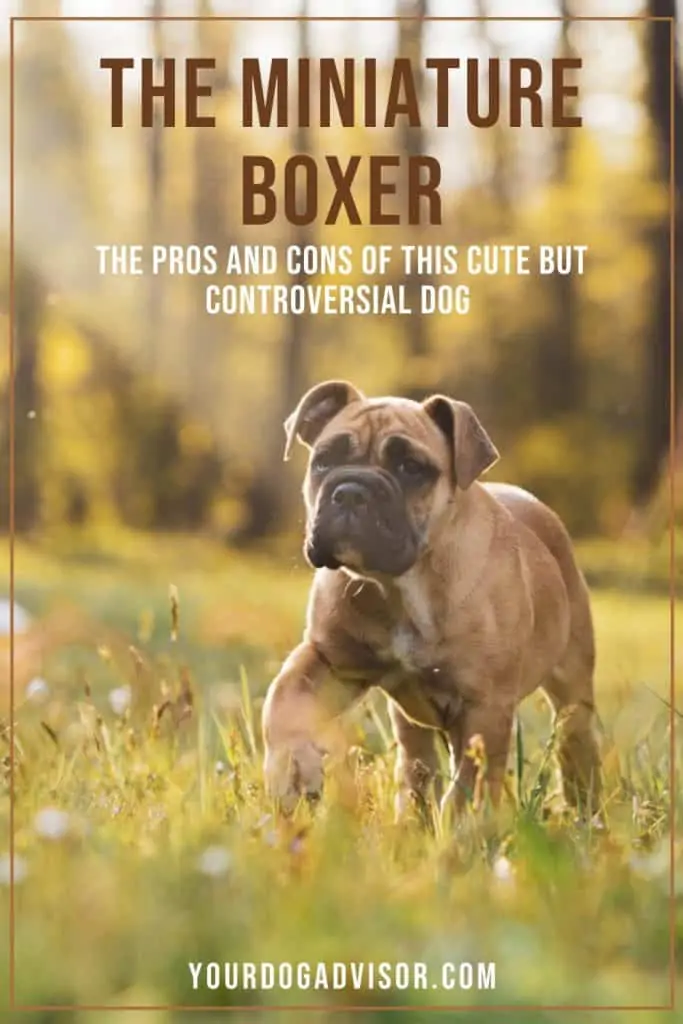Miniature dogs are becoming increasingly popular, especially here in the United States. We have the Mini Labrador, the Mini Goldendoodle, the Miniature Poodle and, now, we have the Miniature Boxer.
Yes, you read that right. There is now such a thing as a Miniature Boxer joining the ranks of other bred-down breeds that we know and love.
But just what is a Miniature Boxer, and are there any pros and cons a potential owner should know about before investing?
We are here to answer all of those questions and more. Let’s get started!
Contents
What Is A Miniature Boxer?
A Mini Boxer is often achieved using specific breeding practices.
Other Names: Mini Boxer, Miniature Boxer
Height: 15 to 22 Inches
Weight: 25 to 55 Pounds
Temperament: Loyal, Affectionate, Playful
Best Suited For: Families With Children, Families With Other Dogs
Lifespan: 12 to 15 Years
Health Issues: Cancer, Hypothyroidism, Bloat, Heart Issues, Deafness, Patellar Luxation, Eye issues, Hip Dysplasia, Allergies, Megasophagus, Reverse Sneezing, Skin Issues, Allergies, Demodicosis
Breed Clubs That Recognize the Miniature Boxer: None
Breed Overview:
The Miniature Boxer is typically not a purebred, although there are instances when you can get a purebred Mini Boxer through less than responsible breeding. This dog is also not an official breed standard of the Boxer purebred, so he’s not recognized by most major breed clubs.
Relatively new to the canine scene, the Miniature Boxer is making waves for his family friendly nature, adorable appearance and devoted temperament. But just because this cutie might make the perfect dog for the right family doesn’t mean he’s the right dog for you.
It’s also important to remember that not all breeders of Miniature Boxers are reputable, and some may have less than quality breeding standards that could result in unhealthy dogs.
And this brings us to the origin of the Miniature Boxer and what you should know about controversial breeding practices. Keep reading.
The Origin of the Mini Boxer and What You Should Know About Controversial Breeding Practices
Mini Boxers are not an official size variety of Boxer dog.
On paper, the Miniature Boxer sounds like the perfect companion. This is especially true if you already have an affinity for Boxers and all their endearing qualities. Named for the way these dogs “box” when playing or protecting themselves, Boxer dogs are some of the United States’ most popular breeds.
The Boxer was inspired by ancient war dogs dating as far back as 2,500 BC. However, the traditional Boxer we are more familiar with today is a likely descendant of Bullenbeisser dogs (AKA Bull Biter dogs) and mastiff type dogs bred from Germany during the late 1800’s.
Traditionally, Boxers were bred to be versatile working dogs. They served as guard dogs, cattle dogs, war dogs, and even guide dogs and service dogs. Today, the Boxer is number 11 out of 197 on the American Kennel Club’s list of most popular dog breeds, so it’s no surprise that fanciers of the breed would come up with the idea to create a smaller, more compact version of this family favorite.
And this brings us to the Miniature Boxer.
Miniature Boxers are still relatively new, which is one of the reasons they have yet to be considered an official size variety of purebred Boxer. They are also somewhat controversial, as the practices for breeding Miniature Boxers come with some amount of risk.
According to most experts, there are three methods a breeder could use tocome up with a Miniature Boxer. These methods include the following:
Breeding Dwarfism:
Breeding dwarfism is a very controversial method some breeders use when attempting to create Miniature Boxer dogs. While this method does keep a Miniature Boxer litter purebred, it also puts the puppies at a much higher risk of serious health issues like spinal problems, breathing difficulties and muscle development.
Purposefully breeding dwarfism into dogs like Boxers can cause other issues as well down the road, which may lead to devastating and costly problems for owners.
For this reason, most reputable breeders will refrain from purposefully breeding dwarfism into their dogs.
Breeding Runts:
The other common way some might go about breeding smaller than average Boxer dogs is to breed runts. Although the term “runt” is not widely recognized as an official term by most experts, it is widely understood by most everyone to mean a puppy that is the smallest and weakest of the litter.
When puppies are born runts, they are also usually born with other underlying health issues. Breeding runts to create a Miniature Boxer means that these dogs have a much higher risk of being born unhealthy and going on to live unhealthy lives.
Again, because of the health risks and moral implications of breeding runts, most reputable breeders will stay away from this method for how to create a Mini Boxer dog.
Crossbreeding:
The last way, and perhaps safest way, of creating a Miniature Boxer dog would be through crossbreeding.
Crossbreeding is the act of breeding two purebred dogs in an effort to combine these dogs’ most desirable traits. A crossbred Mini Boxer is most often going to be a Boxer mixed with a Boston Terrier. If combined correctly, the resulting puppies would be smaller than the traditional Boxer while still maintaining that unique Boxer-like appearance and temperament.
While crossbreeding is the safest and healthiest way to go about breeding smaller Boxer dogs, there are still some cons to this method. For example, many traits of early generation crossbreed dogs will be unpredictable, including traits like health, appearance and temperament.
And while crossbreed dogs may be viewed as healthier than purebred dogs thanks to what is known as hybrid vigor (the idea that they have a wider genepool than their purebred counterparts and are thus less susceptible to genetic disease), they also have a longer list of health issues to contend with.
That said, if you are keen on getting a Miniature Boxer to call your own, we would recommend looking for a crossbreed Mini Boxer as opposed to one of the other types listed above.
The Miniature Boxer – Temperament and Personality Traits
For the most part, Miniature Boxers have many of the same characteristics as their average sized Boxer counterparts.
Regardless of how your Miniature Boxer was created, the truth is that the majority of his temperamental traits should be the same as his standard Boxer counterpart.
As a breed in general, Boxers are known to be intelligent, affectionate, playful and family oriented. They can be high energy dogs and do well in active families and in homes with large, securely fenced yards where they can run and play freely.
When properly socialized, the Miniature Boxer can get along well with other dogs and children. In fact, the Miniature Boxer may be a better option for those with younger children, as full sized Boxers can be a bit overwhelming for small kids.
Still, Miniature Boxers are not pocket pups. They are considered medium sized dogs, which means they may not be the best suited for apartment living, especially if all of their exercise and mental stimulation needs are not met.
That aside, when in the hands of the right owner and when trained, socialized, and exercised properly, the Miniature Boxer can do well with active families, novice dog owners, singles, couples, and active retirees.
How To Train and Socialize a Miniature Boxer
Training should be done utilizing positive reinforcement techniques and consistency.
We touched on training briefly above, but it’s very important that a potential owner of a Miniature Boxer takes training and socialization seriously. For the most part, Miniature Boxers are sweet and affectionate dogs, but without proper training and socialization they can develop serious behavioral issues down the road.
How To Socialize A Miniature Boxer
Socialization should begin as early as you get your Mini Boxer and will continue on with your dog throughout his lifetime. Making sure you properly socialize a dog means that you should try and introduce that dog to as many new people, places, sights, sounds and experiences as possible as young as possible.
Ensuring these first impressions are positive for your Miniature Boxer are also important, so refrain from forcing your Boxer into a situation that he is clearly frightened of or this could lead to fear-based behavioral issues down the road.
Along with socialization, it’s also important to implement training at the same time.
How To Train A Miniature Boxer
Miniature Boxers are intelligent dogs. They are eager to please and quick to learn, especially when training is kept light, fun and game-like. Just as with socialization, you can begin training your Miniature Boxer as soon as you bring him home.
Use treats and praise as opposed to punishments and scolding, as positive reinforcement training techniques have been shown consistently to work better than aversive training methods.
Worse still, negative reinforcement training techniques can lead to a breakdown in your bond with your dog, and even hinder his learning progress.
The Miniature Boxer’s Exercise and Mental Stimulation Needs
Though smaller than average, Miniature Boxers still require plenty of routine exercise.
Miniature Boxers are certainly smaller than average sized Boxers, but that doesn’t mean they don’t require plenty of exercise. Just like their larger counterparts, Miniature Boxers are energetic dogs who require routine exercise each and every day.
The best exercise for a Miniature Boxer will be a routine walk for 40 minutes to an hour each day. Mini Boxers might also enjoy light hikes or trips to the dog park.
When exercising your Miniature Boxer, it’s super important that you use the right equipment. Because these dogs are energetic and may be prone to pulling on walks, we recommend using harnesses that are specified to reduce pulling safely without putting pressure on your dog’s sensitive neck or trachea.
Easy Walk Front Clip Harness
No products found.
This harness by Easy Walk is a harness that is specifically designed to reduce pulling safely and gently. It clips in the front, which reduces your Miniature Boxer’s natural urge to pull and instead redirects him back to your side if he gets ahead of himself.
Most importantly, this harness is safe for your dog and will not cause choking. It also helps to teach him good walking manners, especially when paired with treats, praise and consistency.
Along with ensuring your dog is properly exercised physically each day, it’s important to make sure he has routine mental stimulation. Boxers are intelligent dogs, and the Miniature Boxer is no exception.
If not kept properly exercised and mentally stimulated, the Miniature Boxer may be prone to some serious destructive behavioral issues including barking, marking and chewing, as well as some dangerous behavioral issues like anxiety, which can lead to aggressive behaviors.
Investing in puzzle toys, KONGS, and keeping up with routine training can help ensure your Mini Boxer is happy and healthy both metnally and physically.
Grooming A Miniature Boxer – Tips and Tools
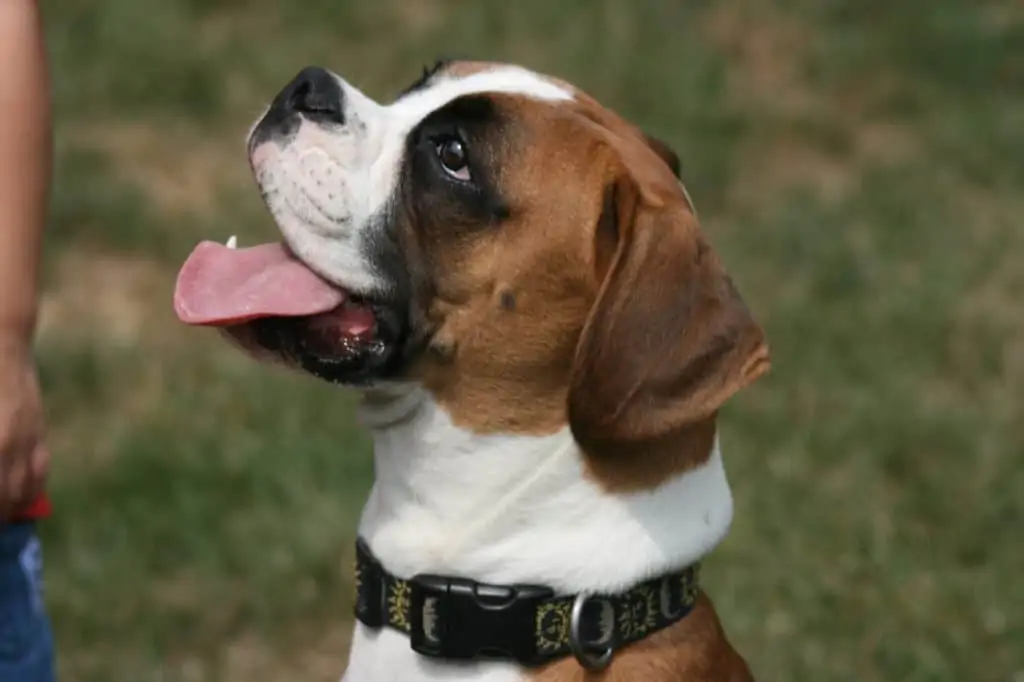
Grooming is another important part of being a responsible pet parent, and it’s an excellent way you can help build the bond between you and your Miniature Boxer. The good news is that grooming a Miniature Boxer is relatively easy.
These dogs have short, smooth coats and while they do shed year-round, they don’t shed excessively. Brushing them once or twice a week can help combat any loose hair, as can ensuring you keep your Miniature eBoxer on a quality dog food.
It’s also important to check your Miniature Boxer’s ears often and keep them clean of moisture build up, wax and debris. This will help keep ear infections at bay and reduce odor. Boxers are athletic, so it’s a good idea to keep their nails ground down to reduce chances of them cracking or splitting during play.
Your Miniature Boxer should also have his teeth brushed at least once a day using a dog safe toothpaste to help keep dental disease at bay.
Last, bathing is going to play an important role in your Miniature Boxer’s overall health and appearance, but it’s best not to overbathe your Boxer as this can lead to a reduction of the natural oils his skin produces to help keep his coat healthy. We also recommend you invest in a quality dog shampoo.
Wahl Dry Skin and Itch Relief Dog Shampoo
No products found.
Some Boxers can be prone to allergies and skin issues, so we would recommend a soothing dog shampoo made with quality ingredients and specified for dogs. The above dog shampoo by Wahl is made with all natural ingredients like coconut oil and oatmeal. It is also free of any dyes, parabens, and alcohols that could exasperate already sensitive skin.
We also like this shampoo because you don’t need to use a whole bunch of it to get it to lather. This means that the bottle lasts longer and you won’t need to replace it as often.
What You Should Know About A Mini Boxer’s Health
Mini Boxers can struggle with a number of health issues, especially if they were not responsibly bred.
If you go through reputable sources and find a crossbreed version of the Miniature Boxer, there is no reason your dog shouldn’t be able to live a long and happy life.
However, keep in mind that irresponsible breeding practices can lead not only to shorter lifespan, but also a lesser quality of life that can be devastating and costly.
Average Lifespan Of A Mini Boxer: 12 to 15 Years
Potential Health Issues Of A Mini Boxer:
- Cancer
- Hypothyroidism
- Bloat
- Heart Issues
- Deafness
- Patellar Luxation
- Eye issues
- Hip Dysplasia
- Allergies
- Megaesophagus
- Reverse Sneezing
- Demodicosis
Tips on Raising a Happy and Healthy Miniature Boxer
As we mentioned above, one of the ways you can go about ensuring you obtain a healthy Miniature Boxer is to ensure you go through reputable sources. We would recommend investing in a crossbreed Miniature Boxer as opposed to a Boxer that was purposefully bred with dwarfism or a Miniature Boxer that is the offspring of runts.
Other ways to ensure your Mini Boxer is as healthy as possible is to consider having him health screened early on. It’s a good idea to keep up with routine vet visits throughout his life as well. Most vets recommend that dogs under the age of seven be seen annually for wellness exams, while dogs over the age of seven be seen twice annually.
Last, experts recommend keeping your Miniature Boxer on a quality dog food specified for his age, weight and activity level. Like all dogs, Mini Boxers do best on dog food that is rich in real meat protein, carbs, fatty acids, vitamins and minerals, and contains a good source of water.
Stay away from dog foods with additives, byproducts and fillers that could exacerbate allergies or lead to food related health issues like Bloat.
Diamond Naturals Salmon And Potato Recipe
No products found.
We like quality dog food like Diamond Naturals Salmon and Potato Recipe for dogs like the Miniature Boxer because it is free of chicken, which can exacerbate allergies. This dog food is also designed to help promote skin, bone and joint health, and can even help boost your dog’s immune system.
This dog food even contains superfoods, probiotics, and vitamins and minerals that are important for a dog’s balanced diet.
Noyal Puzzle Feeder
No products found.
Additionally, we recommend investing in a puzzle feeder for dogs like the Miniature Boxer. Mini Boxers can be prone to Bloat, which is a serious and often life threatening condition caused when a dog eats or drinks too quickly.
A puzzle feeder like the one listed above helps build healthy eating habits and reduces the amount of air your dog swallows, which is one of the leading contributors to Bloat. This type of slow feeder also helps to slow eating, improve digestion and encourage a healthy weight.
Is The Miniature Boxer Right For You? Pros and Cons To Consider
Like all dogs, the Miniature Boxer comes with his fair share of pros and cons.
Before you consider if the Miniature Boxer would be the right dog for you, it’s important to consider if you would be the right owner for him.
Miniature Boxers are best suited for owners with a backyard, or at least a flexible schedule that allows them to get out with their dog once or twice a day. The Miniature Boxer may also come with some unique health issues, so a potential owner should consider investing in pet health insurance.
The good news is that Mini Boxers do wonderfully with children and other pets, so long as they are properly trained and socialized. They will enjoy active households and being a valued member of their human family.
So, are you still considering a Miniature Boxer? We honestly can’t blame you. These dogs are incredibly cute and their personality is just as charming as their appearance. Of course, like all dogs, the Miniature Boxer does come with his fair share of pros and cons.
Pros of A Miniature Boxer
- They are smaller than average sized Boxers
- They are less expensive to feed and upkeep
- Mini Boxers require slightly less maintenance as far as exercise
- Mini Boxers can do well in smaller spaces, though they are not ideal apartment dogs
- Mini Boxers are family-friendly
- They are intelligent, eager to please and easy to train
- They are relatively affordable when going through reputable sources
Cons of A Miniature Boxer
- The breeding practices to create Mini Boxers is controversial
- It is easy to wind up with a sick Miniature Boxer if you go through a reputable source
- The Mini Boxer can be prone to a long list of serious health issues
- The Miniature Boxer can be high energy and requires an active owner
- The Miniature Boxer is a shedding dog and may not be ideal for allergy sufferers
- Though smaller than the standard sized Boxer, Mini Boxers may not be ideal apartment dogs
How You Can Find The Healthiest Miniature Boxer Puppy Or Rescue Possible
It’s very important you go through sources you trust when looking to find a Miniature Boxer to call your own.
If you’ve decided that the Mini Boxer is the right dog for you, then congratulations are in order. These dogs can make wonderful family companions, especially when they are obtained through reputable sources.
Since the breeding and selling of Miniature Boxers is relatively new, and since there is a risk of accidentally going through irresponsible sources when looking for Miniature Boxer puppies, we want to help ensure you wind up with the healthiest Miniature Boxer dog possible.
Here are some tips and tricks from experts.
When Going Through A Breeder
As we discussed above, the safest method right now for obtaining a healthy Miniature Boxer is to go with breeders who crossbreed this type of dog. A crossbreed Mini Boxer will be a purebred Boxer mixed with a purebred Boston Terrier, or another form of similar dog that can help maintain the Boxer’s overall physical appearance and temperament.
When looking for reputable breeders, be sure to ask plenty of questions and don’t be afraid to ask for references. On average, a Miniature Boxer through a breeder costs between $450 to $2,000.
Experts warn against going through breeders who are selling puppies for way higher than the average cost, but it’s just as important to be careful of breeders who are practically giving their puppies away.
Instead, choose reputable breeders who can provide you with paperwork proving your dog has been health screened and cleared of any serious health issues. You may also get a chance to meet your Miniature Boxer’s parents, which can be a good indicator as to how big your puppy will grow up to be and what he or she might look like.
Whatever you do, be sure to steer clear of backyard breeders, online sellers, or breeders who are not qualified, don’t have a license, or who have used irresponsible breeding methods to create a Miniature Boxer dog.
When Going Through A Rescue
Another option you have, and one that we fully support, is going through a rescue or shelter to adopt your Miniature Boxer. While it may be more difficult to find a Mini Boxer through a shetler, there are some breed specific shelters that deal with Boxers and Boxer mixed dogs that may be able to point you in the right direction.
Going through a rescue to obtain your dog is usually going to be less expensive than going through a breeder, though there are fees. On average, rescuing a dog costs between $250 and $500.
If you do go through a rescue, be sure to ask questions and describe your lifestyle to the shelter. Based on this information, they can help you find a dog that best suits your personality.
There are other added benefits of going through a shelter to find a Mini Boxer as well. For example, if you adopt an adult Miniature Boxer he or she may have already been spayed or neutered. Older Mini Boxers will have likely undergone some behavioral training and testing, and some may even be microchipped.
Of course, rescuing a dog is not for everyone, and if you prefer to raise your Miniature Boxer from puppyhood we totally understand.
Remember, the road you take to get your Mini Boxer is up to you. The important thing is that you’re here now doing your homework to ensure you and your dog start off on the right foot.
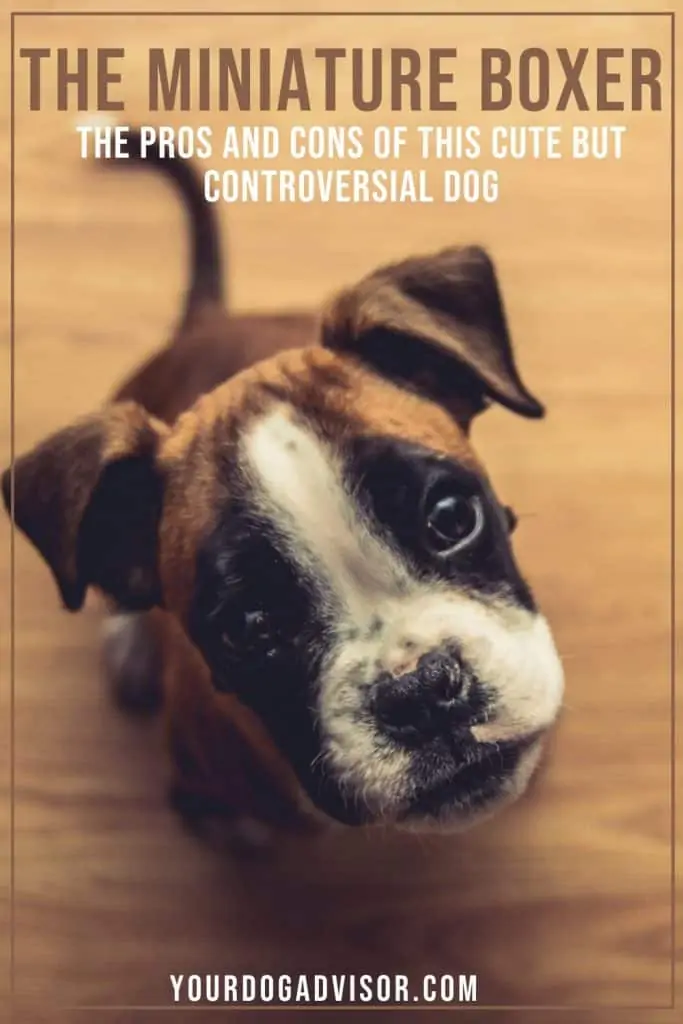

Jen Jones is a professional dog trainer and behavior specialist with more than 25 years of experience. As the founder of ‘Your Dog Advisor’ and the ‘Canine Connection’ rehabilitation center, she applies a holistic, empathetic approach, aiming to address root causes rather than merely treating symptoms.
Well known for her intuitive and compassionate approach, Jen adopts scientifically-proven, reward-based methods, encouraging positive reinforcement over punishment. Jen specializes in obedience training, behavior modification, and puppy socialization. Her innovative methods, particularly in addressing anxiety and aggression issues, have been widely recognized. Jen has worked with many of the world’s leading dog behaviorists and in her free time volunteers with local animal shelters and rescue groups.
